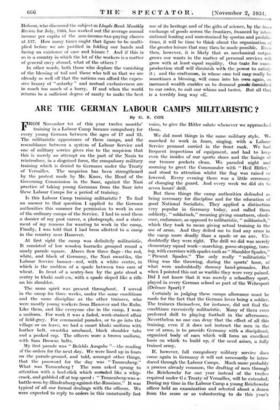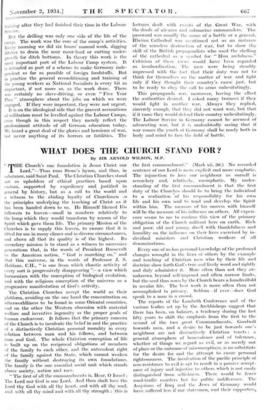ARE THE GERMAN LABOUR CAMPS MILITARISTIC ?
By G. S. COX FROM November 1st of this year twelve months' training in a Labour Camp became compulsory for every young German between the ages of 17 and 25. The militaristic appearance of these camps, and the resemblance between a system of Labour Service and one of military service gives rise to the suspicion that this is merely an attempt on the part of the Nazis to reintroduce, in a disguised form, the compulsory military training which is denied to Germans under the Treaty of Versailles. The suspicion has been strengthened by the protest made by Mr. Knox, the Head of the Governing Commission in the Saar, against the Nazi practice of taking young Germans from the Saar into these Labour Camps for a period of training.
Is this Labour Camp training militaristic ? To find an answer to that question I applied to the German authorities this summer for permission to work in one of the ordinary camps of the Service. I had to send them a dossier of my .past career, a photograph, and a state- ment of my reasons for wanting to work in the camp. Finally, I was told that I had been allotted to a camp in the country near Hanover.
At first sight the camp was definitely militaristic. It consisted of low wooden barracks grouped round a sandy parade square. Above flew three flags—the red; white, and black of Germany, the Nazi swastika, the Labour Service banner—red, with a white centre, in which is the emblem of a spade between two ears of wheat. In front of a sentry-box by the gate stood a sentry in khaki unifcm, with a spade sloped like a rifle on his shoulder.
The same spirit was present throughout. I served in the camp for three weeks, under the same conditions and the same discipline as the other trainees, who were mostly young workers from Hanover and the Ruhr. Like them, and like everyone else in the eanip, I wore a uniform. For work it was a faded, work-stained affair of field-grey. For ceremonial parades, or to go into the village or on leave, we had a smart khaki uniform with leather belt, swastika armband, black shoulder tabs and a peaked cap. The officers wore a brown uniform, with Sam Browne - belts.
• My first parade was " Befehls Ausgabe "—the reading of the orders for the next day. We were lined up in fours on the parade-ground, and told, amongst other things, that the password for the day was " Tannenberg." What was Tannenberg.? The man asked sprang to attention with a heel-click which sorkided like a whip- crack, and gabbled off at top speed : " Tannenberg-was-a- battle-won-by-Hindenburg-against-the-Russians." It was typical of all our formal dealings with the officers. We were expected to reply to orders in this unnaturally fast voice, to give the Hitler salute whenever we approached them.
We did most things in the same military style. We marched to work in fours, singing, with a Labour Service pennant carried in the front rank. We had frequent inspections of equipment, and had to keep even the insides of our sports shoes and the linings of our trouser pockets clean. We paraded night and morning to greet the Commander with " Heil Hitler," and stood to attention whilst the flag was raised or lowered. Every evening there was a little ceremony of changing the guard. And every week we did six to seven hours' drill.
But these things the camp authorities defended as being necessary for discipline and for the education of good National SocialiSts. They applied a distinction very popular in Germany today, and called them soldierly, " soldatisch," meaning giving smartness, obedi- ence, endurance, as opposed to militaristic, " militarisch," which they took to mean giving actual training in the use of arms. And they defied me to find any arms in the camp more deadly than a spade or an axe. Un- doubtedly they were right. The drill we did was merely elementary squad work—marching, goose-stepping, turn- ing, with exercises with spades such as " Shoulder Spades," " Present Spades." The only really " militaristic " thing was the throwing, during the sports' hour, of what were undoubtedly dummy hand-grenades. But when I pointed this out as warlike they were very pained. Did I not know that it was merely a schoolboy sport, played in every German school as part of the Wehrsport (Defence Sport) ?
Certainly in judging these camps allowance must be made for the fact that the German loves being a soldier: The trainees themselves, for instance, did not find the conditions excessively militaristic. Many of them even preferred drill to playing football in the afternoons. Nevertheless no one can deny that the effect of all this training, even if it does not instruct the men in the use of arms, is to provide Germany with a disciplined, organized body of men which will form an excellent basis on which to build up, if the need arises, a fully trained army.
If, however, full compulsory military service does come again in Germany it will not necessarily be intro- duced through the Labour Camps. Much more probably a process already common, the drafting of men through the Reichswehr for one year instead of the twelve required under tl e Treaty of Versailles, will be extended. During my time in the Labour Camp a young Reichswehr officer held an examination and selected about a dozen from the score or so volunteering to do this year's training after they had finished their time in the Labour Service.
But the drilling was only one side of the life of the camp. The work was the core. of the camp's activities. Every morning we did six hours' manual work, digging ditches to drain the sour moor-land or cutting under- growth for ditch • bottoms. In theory this work is the most important part of the Labour .Camp. system. It is intended as part of a scheme to make Germany inde- pendent so far as possible of foreign foodstuffs. But in practice the general reconditioning and training of the young workers as National Socialists is every bit as important, if not more so, as the work done. There was certainly no slave-driving, or even " Five Year Plan " atmosphere about the jobs on which we were engaged. If they were important, they were not urgent.
It is on the ideological side that the gravest accusations of militarism must be levelled against the Labour Camps, even though in this respect they merely reflect the predominant attitude of all German education today. We heard a great deal of the glories and heroisms of war, but never anything of its horrors or futilities. The lectures dealt with events of the Great War, with the deeds of air-aces and submarine commanders. The password was usually the name of a battle or a general. Rheims Cathedral was mentioned not as an instance of the senseless destruction of war, but to show the skill of the British propagandists who used the shelling of the cathedral as a symbol for " Hun awfulness." Criticism of these views would have been regarded as insubordination. The men were being steadily impressed with the fact that their duty was not to think for themselves on the matter of war and fight only if they thought their country's cause just, but to be ready to obey the call to arms unhesitatingly.
This propaganda was, moreover, having the effect the authorities desired. I asked many trainees if they would fight in another war. Always they replied, sincerely enough, that they did not want war, but that if it came they would defend their country unhesitatingly. The Labour Service in Germany cannot be accused of advocating war, but it is undoubtedly seeing that if war comes the youth of Germany shall be ready both in body and mind to face the field of battle.















































 Previous page
Previous page